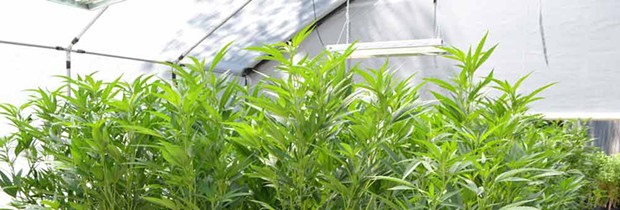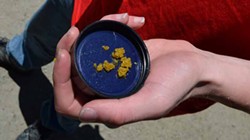[
{
"name": "Top Stories Video Pair",
"insertPoint": "7",
"component": "17087298",
"parentWrapperClass": "fdn-ads-inline-content-block",
"requiredCountToDisplay": "1"
}
]
Wind your way just north of Garberville, through the narrow driveway behind the Renner gas station and, if you can find a place to park, you're in OG Kush heaven. On a sunny, windless day, light beams through a big, open-shutter door onto several rooms bustling with activity. Workers clip leaf bunches off of marijuana plants, strip them of excess leaves, dip the stems in a growth solution and stick them into neat rows of foam beds. Shelves of carefully labeled, tiny plants grow roots under a regimen of light and humidity controls.
Maybe Garberville Grass, the SoHum dispensary, would be better described as Kevin Jodrey heaven. Inside, his shoulder-length gray hair neatly combed under a camo KMUD hat, Jodrey chats rapidly and gregariously with a customer. Then he turns his attention to the operation, which is the culmination of 33 years of experience cultivating.
About a year and a half ago, Jodrey took over Garberville Grass in the site of a former gym and a failed dispensary. The inauspicious site specializes in clones: the cuttings that allow growers to know specifically what they will get out of a plant. It's a model that appears successful, and it makes Jodrey proud. You won't find much in the way of flowers — buds — at Garberville Grass (though they do offer some super-concentrate). "People of our region have cannabis," he says. "They need technical information, ancillary products."
That's Jodrey's wheelhouse. He wants to be a good resource and says that there are "very, very few locally." He talks with senior homes and the Rotary Club and Humboldt State University. "We make a point to educate ourselves and others."
That means taking care of patients, as well. Jodrey says he's given away 5,000 clones of high-cannabidiol strains (which are sought out by people with severe health issues because of the medicinal effects of the compound). Other dispensaries around the state, he complains, charge extra for high-CBD strains, a model in which "the neediest people pay the most.
"People want to run clubs the way they want to run clubs," he says. "You take that attitude and wonder why you have problems with the community."
Jodrey got his start on the East Coast, before moving to San Francisco in the 1980s, during the height of the AIDS crisis. He saw marijuana collectives spring up in the city for sufferers in need of cannabis' pain-relieving effects before medical marijuana was legalized. Then he helped the Humboldt Patient Resource Center become Arcata's model dispensary, gaining the trust and support of the city government even at a time when the feds were threatening city officials with charges related to the city's marijuana ordinance.
Outside Garberville Grass, a large greenhouse is home to the plants waiting to be cloned. Jodrey is animated as he talks about his "girls," showing off how plants are organized by their ratio of medicinal CBD to psychoactive, good-time THC. The more dialogue between nursery and cultivator, Jodrey says, the more feedback he can get about what strains are popular and effective. People aren't guarded when they come to Garberville Grass, meaning the dispensary gets a "phenomenal amount of anecdotal information."
Jodrey sees a renaissance of organic, sustainable agriculture sparked by marijuana. "The modern individual touches plants rarely," he says. In his experience, many farmers who now grow food initially skipped the community garden and first got their hands dirty growing pot. They seek the best yields and the safest, cleanest practices. "All of a sudden they start asking themselves 'Is my food this good?'"
Jodrey refers to himself as a "ganjier" — a cannabis culturalist, a term that loses the derogatory tone of "stoner." He's become close with many patients over the years and sees how marijuana helps. "Opiates throw them into a stupor. If you need them you need them," he said, "but there's less quality of life on a regular opiates schedule." Still, he doesn't characterize pot as a panacea and he acknowledges how much remains scientifically unknown about marijuana. "[Patients] die a little more gently. Cannabis takes away some of the hard edge of death."
Comments (3)
Showing 1-3 of 3
more from the author
-
Flamin' Hot's Stale Corporate Propaganda
- Jun 15, 2023
-
Hell is Visiting Other People
- Sep 22, 2022
-
The Bear Roars
- Aug 18, 2022
- More »


































